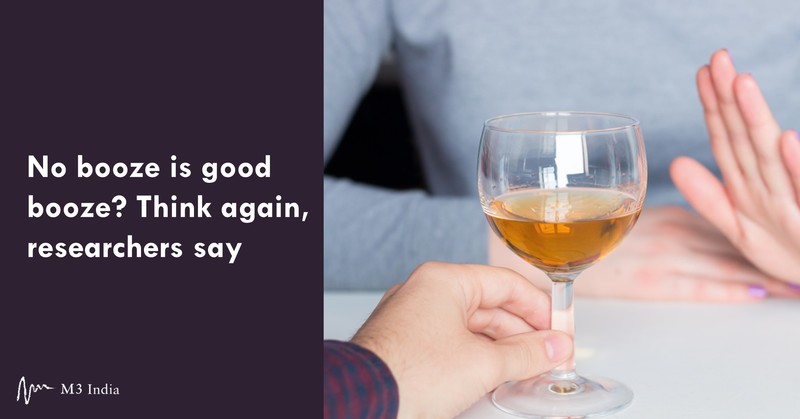No booze is good booze? Think again, researchers say
M3 Global Newsdesk Mar 14, 2020
Does drinking alcohol provide any health benefit? In a widely publicised report in The Lancet in 2018, researchers concluded that there is no healthy level of alcohol consumption. But, a new analysis of the data may offer a sliver of hope for the world’s tipplers.
No health benefits of alcohol?
Up until the last few years, the general consensus had been that moderate drinking did not cause much health risk, and even provided some health benefits in terms of lower mortality and reduced risk of coronary heart disease. Researchers described a J-curve in which light or moderate drinking (one to two drinks per day for women and two to four drinks per day for men) provided more health benefits than abstaining from alcohol. However, drinking alcohol in excess of those moderate limits resulted in dose-dependent increases in the risks of certain cancers, cirrhosis, and death.
When the study in The Lancet appeared, it dashed any idea of the health benefits of alcohol. It made headlines on major news outlets like the BBC, CNN, and The New York Times. The authors concluded,
“Our results show that the safest level of drinking is none. This level is in conflict with most health guidelines, which espouse health benefits associated with consuming up to two drinks per day.”
The researchers did find statistically significant evidence for the J-shaped curve for ischaemic heart disease, but they argued that this benefit was offset by the overall health risks of alcohol.
Lead author Max Griswold, who at the time of the study was a PhD candidate at the Institute for Health Metrics and Evaluation, University of Washington, Seattle, WA said,
“The widely held view of the health benefits of alcohol needs revising, particularly as improved methods and analyses continue to shed light on how much alcohol contributes to global death and disability."
A systematic measurement error
That seemed like the end of the story for alcohol: It’s never good for you, and it always poses a risk.
But in a recently published article in JAMA Internal Medicine, researchers took another look at the data in The Lancet study—and found that the risks of alcohol consumption may have been overestimated.
In The Lancet study, the researchers gauged the consumption of alcohol by first looking at sales data of alcohol in 195 countries and territories around the world, even controlling for alcohol consumption by tourists and other unrecorded consumption.
In addition to sales data, their estimates of individual consumption were also based on drinkers’ self-reported data.
However, heavy drinkers underreport their actual levels of alcohol consumption by up to 40% to 65%, noted researchers in the JAMA Internal Medicine article, led by Mary C. Vance, MD, MSc, assistant professor of psychiatry and a scientist at the Center for the Study of Traumatic Stress, Uniformed Services University, Bethesda, MD.
The authors of The Lancet study apparently didn’t take this underreporting into account, leading to a potential systematic measurement error in their assessment of risk factors. This underreporting may have resulted in an overestimate of the risk of adverse health outcomes from a low amount of alcohol consumption, Dr. Vance and coauthors pointed out.
They wrote,
“If 30% of at-risk drinkers underreport their drinking by 1 to 2 drinks per day and if 30% of heavy drinkers try to hide their drinking by saying they only drink 1 to 2 drinks per day, this underreporting could lead to biased study findings that misrepresent a reality in which 1 drink per day reduces the risk of adverse health outcomes by 5% and 2 drinks per day result in no net harm."
Dr. Vance explained:
"The bottom line is, the more that heavy drinkers underreport their drinking, the more that the risks associated with low levels of alcohol use will be overestimated."
The argument continues
Does this mean that The Lancet authors got it wrong? And if so, what level of alcohol does provide a health benefit? Dr. Vance and colleagues conceded that their analysis couldn’t answer such questions. They wrote,
“Our intent was to show a potential problem with reported risk estimates, not to generate new risk estimates that can reliably be used in real-world settings."
They also added that it wasn’t their intent to minimise the very real public health harms of heavy alcohol use, but to illustrate an underappreciated statistical phenomenon.
So, the ambiguity about the potential health benefits of consuming low levels of alcohol continues.
David Spiegelhalter, PhD, Winton Professor for the Public Understanding of Risk, University of Cambridge, Cambridge, UK, told BBC News said,
“Given the pleasure presumably associated with moderate drinking, claiming there is no ‘safe’ level does not seem an argument for abstention. There is no safe level of driving, but the government does not recommend that people avoid driving. Come to think of it, there is no safe level of living, but nobody would recommend abstention.”
This story is contributed by John Murphy and is a part of our Global Content Initiative, where we feature selected stories from our Global network which we believe would be most useful and informative to our doctor members.
-
Exclusive Write-ups & Webinars by KOLs
-
Daily Quiz by specialty
-
Paid Market Research Surveys
-
Case discussions, News & Journals' summaries
